
TikToker Edward Sentenced to Six Years in Jail for Insulting Ugandan President Museveni and First Family
In a significant development that underscores the delicate balance between free speech and respect for authority, Ugandan TikToker Edward has been sentenced to six years in jail. The verdict came after Edward was found guilty of using social media to insult President Yoweri Museveni and members of the first family. This case has sparked widespread debate about the limits of free expression in Uganda.

The Incident
Edward, a popular figure on TikTok known for his candid and often provocative commentary, posted a series of videos criticizing President Museveni and his family. The content, deemed offensive and disrespectful by authorities, quickly went viral, leading to his arrest and subsequent trial.
Legal Proceedings
The Ugandan judiciary acted swiftly, charging Edward under the Computer Misuse Act, which penalizes offensive communication. During the trial, the prosecution argued that Edward’s videos not only insulted the President and the first family but also incited public unrest and disrespected the nation’s leadership.
Sentencing
The court sentenced Edward to six years in prison, a decision that has elicited mixed reactions from the public and international observers. While some argue that the punishment is justified to maintain respect for national leaders, others view it as an excessive crackdown on free speech.
Public Reaction
The sentencing has stirred a significant response from both local and international communities:
-Supporters of the Sentence: Some Ugandans believe that such a punishment is necessary to deter others from making disrespectful comments about national leaders. They argue that maintaining respect for the presidency is crucial for national stability and unity.
-Critics of the Sentence: Human rights activists and free speech advocates have condemned the sentence, arguing that it stifles free expression and sets a dangerous precedent. They contend that the punishment is disproportionately harsh and undermines democratic principles.

International Perspective
International human rights organizations have expressed concern over the ruling. Amnesty International and Human Rights Watch have called for Edward’s release, emphasizing that freedom of speech is a fundamental human right. They argue that critical commentary, even if harsh, should not be met with severe punishment.
The Broader Implications
Edward’s case is a stark reminder of the challenges faced by social media influencers and content creators in restrictive environments. As platforms like TikTok, Twitter, and Facebook become increasingly popular, the clash between free expression and government censorship is likely to intensify.
Summarily, the sentencing of TikToker Edward to six years in jail for insulting President Museveni and the first family has ignited a crucial conversation about the boundaries of free speech in Uganda. While the government insists on the need for respect and decorum, many voices, both local and international, argue for a more balanced approach that protects individual freedoms.
As Uganda continues to navigate its political landscape, the case of Edward serves as a poignant example of the ongoing struggle between authority and free expression. Whether this verdict will deter similar incidents or galvanize a push for greater freedom of speech remains to be seen. The world watches closely, mindful of the broader implications for human rights and democratic governance in Uganda and beyond.





[…] Read More… […]